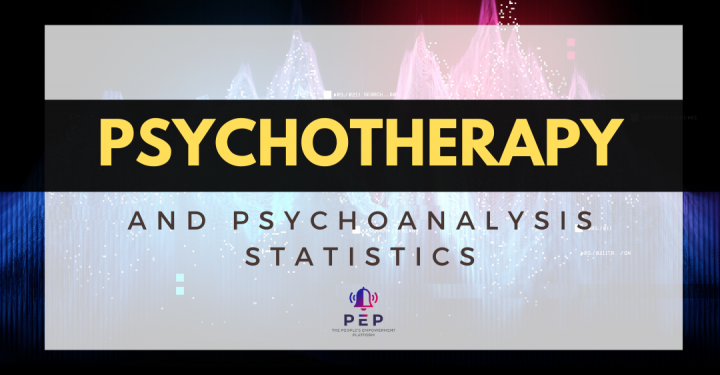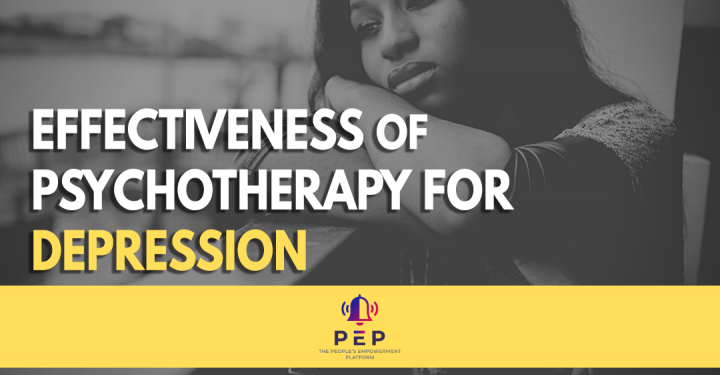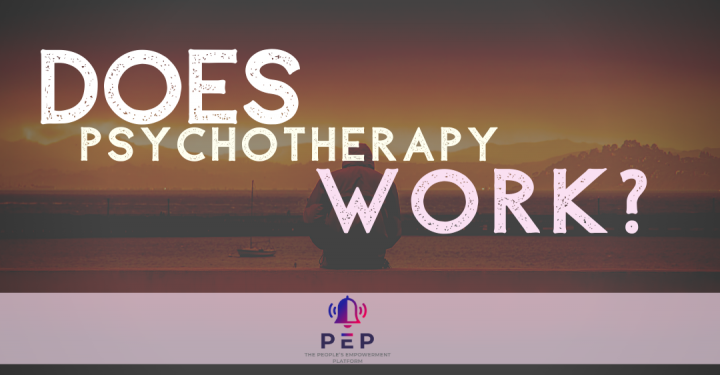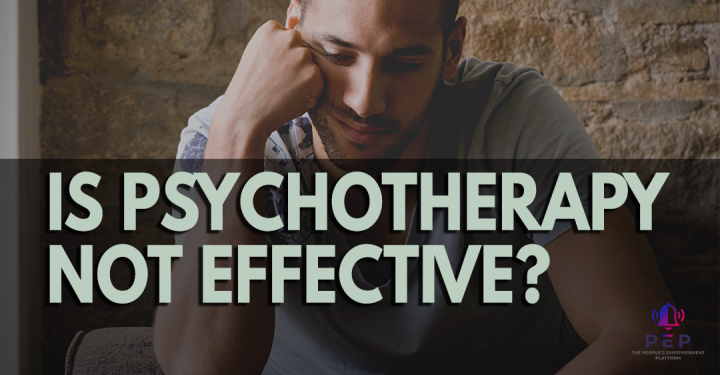Member Sign In
Login with email and password
No account yet? Register Now
Statistics of Psychotherapy: Does Psychotherapy Work and How?

Psychoanalytic criticism has become trendy over the years as many questions the effectiveness of psychoanalysis.
I will attempt to take a more scientific approach to evaluate the validity of psychotherapy, providing statistics, case studies and a bit of personal experience.
Two people meet, and they talk. Somehow, through this conversation, one of them offers help for a mental problem, while the other receives it. Strange as it is, this is how psychotherapy works. And understandably, you'd have questions – "Does this ‘talking therapy' work? How effective is it?"
What is psychotherapy?
Psychotherapy is a general term that describes the process of treating a variety of emotional difficulties and psychological disorders through the use of verbal and psychological techniques.
Also, here’s a brief description of psychotherapy from the American Psychological Association (APA):
“Grounded in dialogue, it provides a supportive environment that allows you to talk openly with someone who is objective, neutral, and nonjudgmental.”
Who provides psychotherapy?
Many different types of professionals provide psychotherapy. Thankfully, though, they all undergo specialized training to treat people for their emotional problems.
And depending upon their academic degree, a psychotherapist can be any of the following:
1. Clinical psychologist
2. Psychiatrist
3. Counselor
4. Marriage and family therapist
5. Social worker
Where did psychotherapy originate from?
Psychotherapy, as a concept, is not new. It can be traced back to ancient Greece.
And while the ancient Greeks’ understanding of mental illness was not always correct (they recommended bathing as a treatment option for depression), they were the first ones to recognize the treatment value of consoling and encouraging words – the very foundation of modern psychotherapy.
When should you consider psychotherapy?
We all experience periods of sadness, stress, grief, and conflict, so when you’re feeling off, it can be challenging to decide when you should seek professional help.
But if you relate to the following signs, it might be time for you to see a psychotherapist:
• The issue is causing significant disruption or distress in your life. If the problem you're facing is now interrupting several critical areas of your daily life – such as work, relationships, and school – it may be time to visit a psychotherapist.
• You are relying on dangerous or unhealthy coping mechanisms. If you find yourself dealing with your problem by excessively drinking, smoking, eating, or taking your frustrations on loved ones, a psychotherapist may be able to help you find more suitable –and healthier – coping strategies.
• Nothing seems to help you with your problem. If you've flipped through multiple self-help books and explored various techniques you read about online, and yet – you're still troubled, reaching out to a psychotherapist may help you back on track to a healthier, happier state of mind.
As psychologist Daniel J. Reidenberg has said:
“The earlier someone gets help, the easier it is to get through the problem. There will be less time and less strain and stress involved in that.”
Why can't patients take medication?
In today’s quick-fix culture, we often hope that popping a pill will offer fast relief from our mental issues. Unfortunately, while there are specific psychological conditions – like severe depression and bipolar disorder – that warrant medication, evidence suggests that in many other cases, medication doesn't always work.
In a 2010 study, for example, researchers found that medication wasn’t any more effective than a placebo when it came to the treatment of mild to moderate depression.
Also, in contrast to psychotherapy, medications don't help clients develop the necessary skills to deal with life's problems. Their issues would likely resurface the moment they stop taking medication.

How does psychotherapy work?
There are many different approaches to psychotherapy. You see, the exact method chosen by a psychotherapist depends on a variety of factors, such as:
1. The training and background of the therapist
2. The preferences of the client
3. The specific nature of the client’s current problem
And so, depending on the interplay of the above factors, a psychotherapist may choose to draw upon any of the following major approaches:
1. Psychoanalytic therapy – Involves diving into a client’s thoughts and past experiences, in search of unconscious thoughts, feelings, and memories that may influence current behavior. Clients are then better able to recognize their emotions and constructively deal with them.
2. Behavioral therapy – Attempts to alter clients’ problematic behaviors through psychological techniques like classical conditioning, operant conditioning, and social learning. This approach aims to teach patients new behaviors to minimize or eliminate the issue.
3. Humanistic therapy – Focuses on helping clients maximize their potential by stressing the importance of self-exploration, free will, and self-actualization.
4. Cognitive therapy – Identifies the negative, cognitive distortions that lead to a pessimistic outlook, and seeks to replace such thoughts with more realistic and positive ones.
5. Cognitive-behavioral therapy – Helps clients better manage their problems by changing the underlying thoughts that contribute to distress – through cognitive techniques – and modifying the problematic behaviors (through behavioral techniques) that result from these thoughts.
How effective is psychotherapy?
Given how expensive psychotherapy can be, the top question on your mind right now is probably, “Does psychotherapy work? Is it effective?”
I'll have to answer your questions in two parts. Why? Well, that's because as counterintuitive as it seems, there's a difference between whether psychotherapy works and its effectiveness.
So, to answer your first question, “Does psychotherapy work?”
Yes, it does. Hundreds of studies have concluded that psychotherapy helps people make positive changes in their lives. Reviews of these studies show that about 75% of people who enter psychotherapy show some benefit.
And in a meta-analysis that reviewed 475 different studies, researchers found that psychotherapy did indeed enhanced the psychological wellbeing of patients.
Other reviews have also highlighted that the average person who partakes in psychotherapy is better off post-treatment, in comparison to 80% of those who don’t receive treatment at all.
Now – you might be frowning. If psychotherapy works so exceedingly well, why am I so cautious in mentioning that it’s effective?

Keep in mind there are two distinct concepts:
1. Efficacy – Defined as the performance of an intervention under ideal and controlled circumstances.
2. Effectiveness – Refers to an intervention’s performance under ‘real-world’ conditions, i.e., its generalizability to the public.
And so, strictly speaking, psychotherapy is efficacious, but its effectiveness – or its generalizability –remains inconclusive because of the following factors:
1. The conditions and characteristics of randomized controlled treatment outcome research relating to psychotherapy differ significantly from those of real-world clinical practice. For example, researchers often exclude patients who have more than one psychological problem from studies. But many people in real-life suffer from multiple disorders – how would we then know what will work for them?
2. Much of psychotherapy's randomized controlled treatment outcome research focuses on improving symptoms or disorders, while many people seek out psychotherapy to cope more effectively with life’s challenges and have a greater sense of meaning in their lives.
The disconnect between the two, therefore, makes it challenging to generalize findings from studies to the general public. And that is why we – technically – cannot say that psychotherapy is effective.
Clinical studies
Study A
In a 2017 study, a group of researchers from Spain and the United Kingdom conducted a meta-analysis on 153 outcome trials involving 29,879 participants with depressive disorders. The researchers sourced for the outcome trials through database searches in Pubmed, PsychINFO, and the Cochrane Central Register of Controlled Trials.
The main objective of the study was to determine the absolute and relative effects of the following treatment methods on functioning and quality of life in patients with depression:
1. Psychotherapy
2. Pharmacotherapy (medication, including anti-depressants)
3. A combination of psychotherapy and pharmacotherapy
While the combination of psychotherapy and medication performed better than either of the treatment options, the researchers found that psychotherapy was more efficacious than pharmacotherapy alone.
Furthermore, psychotherapy was also found to cause fewer adverse side effects such as insomnia, fatigue, restlessness than antidepressants!

Study B
In a 2015 pilot study, researchers from the United States recruited 16 patients with Parkinson's Disease, who also had significant depressive symptoms. The study aimed to investigate the feasibility and impact of CBT for depressed Parkinson’s patients.
To do so, the researchers randomly assigned the participants to two groups:
1. CBT group
2. Usual care group
After eight sessions of treatment, the researchers found evidence that CBT is a feasible approach for these patients.
Also, patients in the CBT group had lower depression severity scores at a one-month follow-up in comparison to those receiving usual care.
None of the subjects experienced adverse effects.
Conclusion
1. Psychotherapy makes use of scientifically validated psychological and behavioral techniques to help people live happier, healthier, and more productive lives.
2. Psychotherapy is not a modern concept; its usage can be traced back to ancient Greece.
3. If you’re currently facing debilitating distress in your life, you might want to consider psychotherapy.
4. The sole use of medication as a treatment option does not impart valuable coping skills that patients need for daily life.
5. There are many different approaches to psychotherapy, and the exact method employed by your psychotherapist will depend on a variety of factors.
6. There's a difference between efficacy and effectiveness – while psychotherapy has mostly been established as being efficacious, evidence for its effectiveness (i.e., generalizability) is still lacking.
Have you ever been to therapy? Would you ever consider engaging the help of a psychotherapist?
Below I've provided a list of reputable online therapy tools and services in the event you'd like to give them a try but don't know where to get started:
1) Online Therapy: Their features include a personal therapist, activity plan, worksheets, journal, live chat, yoga, and more. Follow this link to receive a 20% discount.
2) Blessing Manifesting: Their most popular item is their Self Love Workbook and Planner with seven different add on options including mental health, relationships, business life, sober life, and mom life. They offer a variety of tools for mental health.
3) Weighted Blankets: I know this one is a bit off topic but we use weighted blankets in our home. We have a 10 year old autistic boy, 16 year old girl and two adults in our household. For us weighted blankets help alleviate restlessness, enhances focus and improve our sleep patterns. It's very calming and they last forever. Thought I'd include it.
Please know any commissions I earn from the above services or items will go right back into making more blogs just like this.
Share your insight in the comment section and qualify to win free hoodies, t-shirts and hats.
If you enjoyed this content, please go to PEPRequest.com to stay connected. This allows me to notify you of my posts without using email.
Doesn't matter what platform you follow me on. I'll just buzz you through the The PEP™ and when Instagram, Twitter, Facebook, YouTube, etc. changes their algorithm you and I don't lose contact.
Thank you for being a part of the PEP Profile community. If you’re not yet a member but would like to join the discussion, you can also request an invitation at PEPREQUEST.COM. We love you.
REFERENCES:
Beck, A. T. (1997). The past and future of cognitive therapy. The Journal of Psychotherapy Practice and Research, 6(4), 276–284.
Black, J. L., & Bruce, B. K. (1989). Behavior therapy: A clinical update. Hospital & Community Psychiatry, 40(11), 1152–1158. https://doi.org/10.1176/ps.40.11.1152
Calleo, J. S., Amspoker, A. B., Sarwar, A. I., Kunik, M. E., Jankovic, J., Marsh, L., … Stanley, M. A. (2015). A Pilot Study of a Cognitive-Behavioral Treatment for Anxiety and Depression in Patients With Parkinson Disease. Journal of Geriatric Psychiatry and Neurology, 28(3), 210–217. https://doi.org/10.1177/0891988715588831
Churchill, R., Davies, P., Caldwell, D., Moore, T. H., Jones, H., Lewis, G., & Hunot, V. (2010). Humanistic therapies versus other psychological therapies for depression. The Cochrane Database of Systematic Reviews, 2010(9). https://doi.org/10.1002/14651858.CD007800
Cook, S. C., Schwartz, A. C., & Kaslow, N. J. (2017). Evidence-Based Psychotherapy: Advantages and Challenges. Neurotherapeutics, 14(3), 537–545. https://doi.org/10.1007/s13311-017-0549-4
Fournier, J. C., DeRubeis, R. J., Hollon, S. D., Dimidjian, S., Amsterdam, J. D., Shelton, R. C., & Fawcett, J. (2010). Antidepressant drug effects and depression severity: A patient-level meta-analysis. JAMA, 303(1), 47–53. https://doi.org/10.1001/jama.2009.1943
Hofmann, S. G., Asnaani, A., Vonk, I. J. J., Sawyer, A. T., & Fang, A. (2012). The Efficacy of Cognitive Behavioral Therapy: A Review of Meta-analyses. Cognitive Therapy and Research, 36(5), 427–440. https://doi.org/10.1007/s10608-012-9476-1
Kamenov, K., Twomey, C., Cabello, M., Prina, A. M., & Ayuso-Mateos, J. L. (2017). The efficacy of psychotherapy, pharmacotherapy and their combination on functioning and quality of life in depression: A meta-analysis. Psychological Medicine, 47(3), 414–425. https://doi.org/10.1017/S0033291716002774
Kim, S. Y. (2013). Efficacy versus Effectiveness. Korean Journal of Family Medicine, 34(4), 227. https://doi.org/10.4082/kjfm.2013.34.4.227
Marks, S. (2017). Psychotherapy in historical perspective. History of the Human Sciences, 30(2), 3–16. https://doi.org/10.1177/0952695117703243
Paris, J. (2017). Is Psychoanalysis Still Relevant to Psychiatry? Canadian Journal of Psychiatry. Revue Canadienne de Psychiatrie, 62(5), 308–312. https://doi.org/10.1177/0706743717692306
Smith, M. L. (1982). What research says about the effectiveness of psychotherapy. Hospital & Community Psychiatry, 33(6), 457–461. https://doi.org/10.1176/ps.33.6.457
Understanding psychotherapy and how it works. (n.d.). Retrieved September 25, 2019, from Https://www.apa.org website: https://www.apa.org/helpcenter/understanding-psychotherapy
Login with a social network